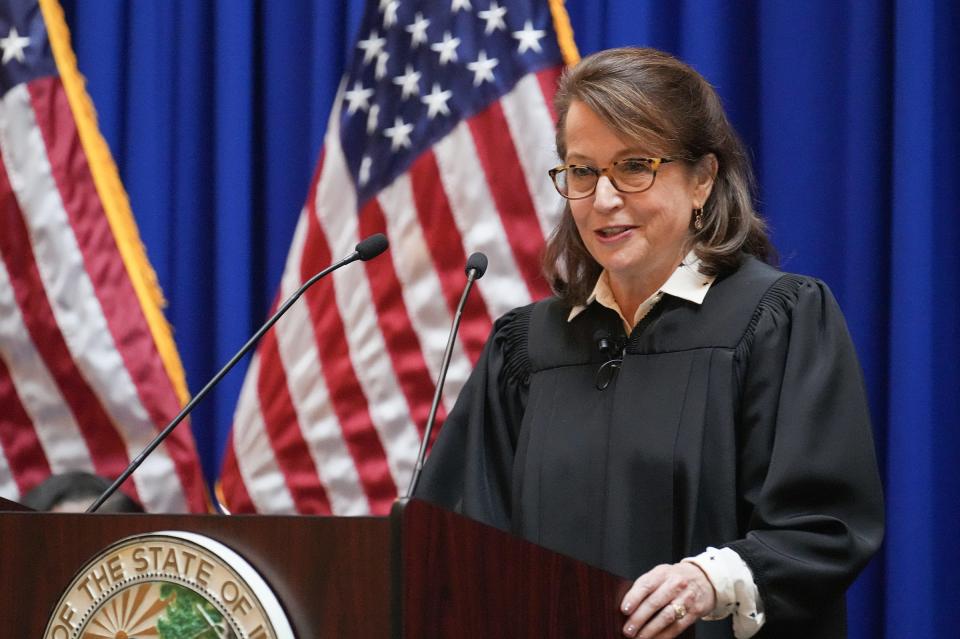Poetic justice: Supreme court cites Lord Byron in verdict against state in dog-death case
- Oops!Something went wrong.Please try again later.
- Oops!Something went wrong.Please try again later.
Indiana Supreme Court opinions don't typically start with a reference to Romantic era poets — in fact, it’s a safe bet a recent ruling Chief Justice Loretta Rush framed with an ode Lord Byron penned to his beloved dog is a first in the history of the state’s highest court.
But this wasn’t just any case — and Rush’s analogy was spot on for the long-running legal dispute that bounced through at least five different courts.

“As captured by Lord Byron’s ‘Epitaph to a Dog,’” Rush started the 11-page opinion, “the death of man’s best friend prompts a visceral response — perhaps none more so than the one here, where a dog’s death triggered over a decade of litigation in state and federal courts.”
The tangled case started with a young driver who accidentally struck and killed a conservation officer’s pet dog. That was followed by the woman being charged with leaving the scene of the accident, a action prompted by the dog’s owner and later determined by a federal court to be a violation of her civil rights.
The courtroom drama continued with the Indiana Attorney General claiming the conservation officer's actions in the case wasn't part of his job so the state wasn't liable for the false arrest judgment — a contention the supreme court rejected.
Along the way, the woman was cleared of the traffic charge, the officer continued working for the Department of Natural Resources, and on Feb. 5 the Supreme Court unanimously ruled the officer's actions were not criminal and state must pay the woman more than $62,000 in damages and legal fees.
No, it wasn't 'a dark and stormy night'
In keeping with Rush’s literary theme, here’s what happened: It was a dark (but not stormy) night in December of 2012 as the young woman drove along a rural Hancock County road. About a mile from her home, a neighbor’s Border Collie darted in front of her vehicle. She hit the dog, and briefly stopped to check on it. When she saw the dog was dead, she continued home to get her fiancé and they returned to tell their neighbor what happened.
Most similar accidents would end with the driver’s acknowledgment and apology. But not this one.
The dog's owner apparently stewed over the death of his family's beloved pet, Gypsy, for weeks.
The court record shows he ultimately approached a deputy in the Hancock County Prosecutor’s office, who he regularly worked with in the course of his official duties, and posed a hypothetical question. It mirrored the scenario involving Gypsy's death. He was directed to an investigator, who looked into the accident and determined there was probable cause — the legal term for adequate evidence — to charge the woman with failing to stop after an accident resulting in non-vehicle damage.
The Hancock County Prosecutor filed a criminal case against her on June 28, 2013 — nearly six months after the accident. The charge was a Class B misdemeanor, with a penalty of up to 180 days in jail and a maximum fine of $1,000.
That's when the legal donnybrook got serious.
Long-running dispute focused on legal questions
The multiple court cases that prompted the supreme court ruling essentially boiled down to three legal questions:
∎ How much time passed before the woman returned to tell her neighbor about the accident?
∎ Did the conservation officer violate the woman's civil rights by his role in the criminal charge?
∎ Was the man acting in his official role as a state employee and, if so, had he committed any crime in that process?
In the unanimous ruling detailed by Rush, the court found the man was acting in his official role and had not committed any crime. That means the state, as his employer, is liable for the fine and the woman's attorney fees under a legal principle called indemnification.
Literature in law: Sherlock Holmes to Goldilocks
There's no central repository for tracking literary references in legal opinions, but a Texas professor did examine "literary allusions in federal appellate decisions" from 1997-2012.
Kristin B. Gerdy Kyle "found 470 federal appellate opinions (from 167 judges and justices) using literary references during the 15-year period," according to a 2022 blog post by Wayne Schiess, a legal writing professor at University of Texas.
He said the research found the most-cited authors included William Shakespeare, George Orwell and Charles Dickens. Others included Edgar Allen Poe, William Faulkner, Dr. Seuss and J.K. Rowling.
Among the most frequently mentioned literary characters, places and symbols: Sherlock Holmes, Goldilocks, Orwell's Big Brother, Lewis Carroll's Wonderland, and the eponymous scarlet letter from the Nathaniel Hawthorne tome.
But there was no mention of Lord Byron or his dog.
This article originally appeared on Indianapolis Star: Poetic justice: Court cites Lord Byron in case prompted by dog's death

